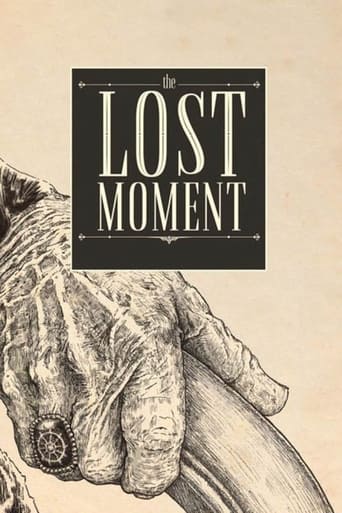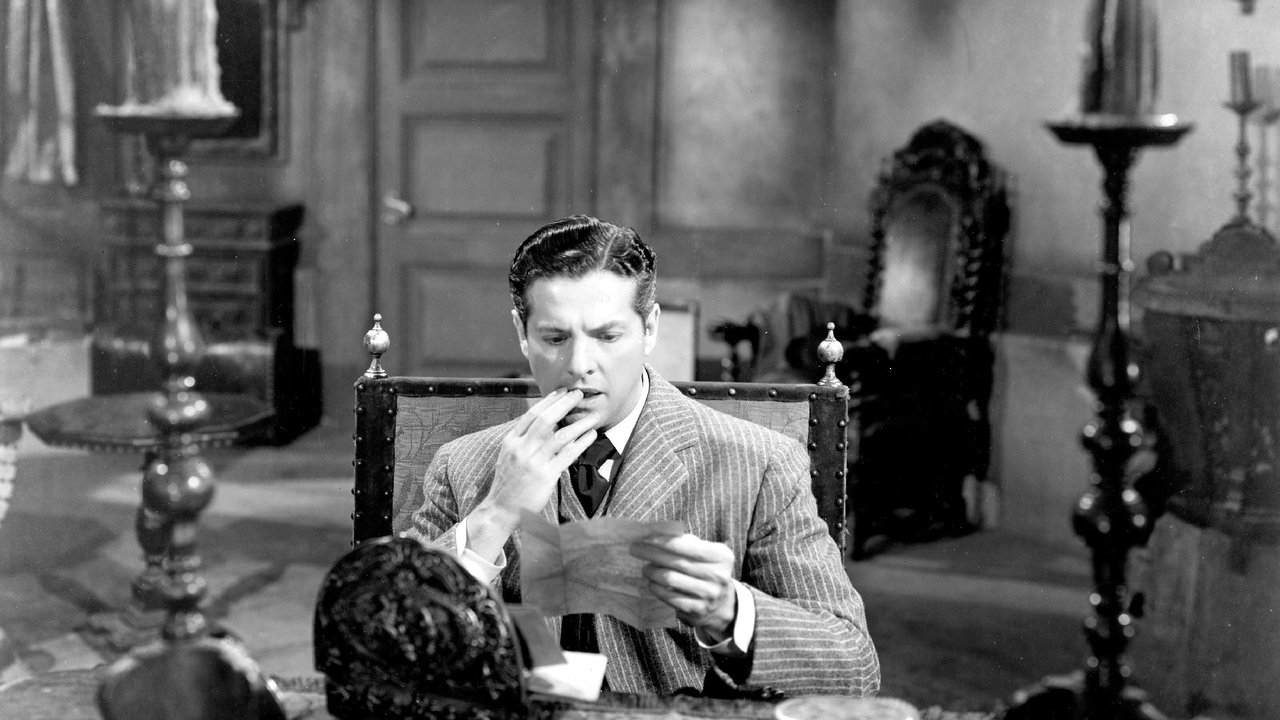mark.waltz
The wonderful Agnes Moorehead is Juliana Borderau, the 105 year old resident of a Venice, Italy villa whose old love letters from a famous poet have become an obsession for American Lewis Venable (Robert Cummings). Venable arrives in Venice, rents a room from Juliana and her niece Tina (Susan Hayward) and starts his own investigation to the location of the mysterious letters and the mystery surrounding Tina's obsession with Juliana's past. What he finds out is as Gothic as "Great Expectations" and "Jane Eyre". Moorehead is unrecognizable (all except her voice, altered to sound like that of an extremely old lady), and her hold on Hayward's Tina is straight out of "Great Expectation's" Miss Havisham. Based on a Henry James story, "The Aspern Papers", "The Lost Moment" has moments of serene romance, moody photography and some genuine chills, but is ultimately a re-tread of stories we've seen many times before. Cummings would not have been my first choice to play such a part, but Hayward is convincing as she brings all of the multiple elements of Tina to life. Moorehead's role is more of a gimmick than a characterization, but she brings more to it than a less capable actress could have.
MartinHafer
"The Lost Moment" is one of the strangest films of the 1940s I have seen. I am not saying it's bad--just very, very different. The film is based on a story by Henry James ("The Aspern Papers") although like MOST films they liberally change the story. One of the most obvious is the character played by Susan Hayward. In the original story, she's described as plain and unattractive--something you could never have said about Hayward. In this film, she is gorgeous and is paired with an odd choice for a leading man, Robert Cummings. Now I am not complaining or saying Cummings was a bad choice--just an odd one since he was a bit older and not the dashing leading man you'd normally expect in a movie.The story was originally based on a notion that some love letters from Percy Shelley were hidden somewhere and literary folks were drooling to find them. Here in "The Lost Moment", they use a fictional name for a guy who was clearly modeled after Shelley. But, unlike Shelley, this poet was an American and he simply disappeared in his prime! The only possible clue to his disappearance is the same woman who was in love with this man--and who supposedly has these love letters. But, she's an ancient recluse and has thus far resisted talking about her old lover and has refused to allow people to read these letters....if they even still exist.Cummings plays a newspaper writer and an opportunist. His plan is to somehow get into this home with the old lady (who is now 105--played by Agnes Moorehead under a ton of makeup). When he learns she is greatly in need of money, he offers to rent out one of her rooms. While they receive him VERY coolly, he is able to secure a room and soon notices just how oppressively dismal the place is. It's like a morgue and a strong brooding sense of doom is well conveyed in the film. I won't discuss the plot any more--it would ruin the suspense. However, to me the plot, though interesting, isn't as important as the mood--which is really excellently conveyed. An interesting film--as there just aren't many like it.
James Hitchcock
Henry James, with his interest in minute psychological examination of his characters and his complex, ornate prose style, has never struck me as being the most cinematic of writers, but in fact there have been some decent film adaptations of his work, such as William Wyler's "The Heiress", based upon his "Washington Square", "The Innocents" from his "The Turn of the Screw" and three Merchant-Ivory productions, "The Europeans", "The Bostonians" and "The Golden Bowl"."The Lost Moment" is, as far as I am aware, the earliest James adaptation for the cinema, made two years before Wyler's film. It was the only film ever directed by Martin Gabel, better known as an actor, but not particularly well-known even for that. It is loosely based upon James's "The Aspern Papers" and is set in Venice in the early 1900s. Lewis Venable, a publisher, arrives in the city in search of the love letters written by the poet Jeffrey Ashton, believing that if he can secure them and publish them he will make a fortune. Ashton (Jeffrey Aspern in James's story) was an early-19th-century Romantic poet, an American contemporary of Keats and Shelley, who disappeared mysteriously in 1843. Venable discovers that Ashton's mistress, Juliana Bordereau, is still alive at the age of 105 and concludes that the letters must still be in her possession. Using a false name, he rents a room in her palazzo.Living with Juliana is a strange young woman, Tina, whom she describes as her niece, although there must be more than one generation between them. Tina is beautiful but austere, dressing in black and wearing her hair severely scraped back, and makes it quite clear that she does not trust Venable. Yet there is another side to her character. One night Venable finds Tina with her hair loose, wearing a white, old-fashioned dress of the mid-nineteenth century, playing the piano. She declares her love for Venable, but calls him "Jeffrey" and clearly believes him to be Ashton and herself to be the young Juliana.Ever since at the early seventies, the era of Visconti's "Death in Venice" and Roeg's "Don't Look Now", it has been virtually obligatory for films set in Venice to celebrate the city's visual beauty. In the 1940s, however, even after the war in Europe had finished, tight budgets often precluded location shooting, and "The Lost Moment" is not a film of that sort. It is made in black-and-white rather than colour, with most of the action taking place indoors inside Juliana's gloomy palazzo. The atmosphere is one of claustrophobia, of Gothic melancholy reminiscent of that found in a number of other American films from the forties and early fifties, such as Hitchcock's "Rebecca" and "Notorious", Max Ophuls's "Caught" and Robert Wise's "The House on Telegraph Hill". (As in "Rebecca", the house turns out to be hiding a dark secret).Although there is a rational explanation for the strange events surrounding Tina- namely that she is suffering from some psychiatric illness- other, unearthly, explanations might suggest themselves to the viewer; at times it seems that Tina is not an individual in her own right but rather the young Juliana, somehow caught in a time-warp and co-existing with her older self. It is notable that the late forties also saw a number of films on the subject of psychiatry, of which "Spellbound" is perhaps the most famous, as well as supernatural fantasies like "A Portrait of Jennie". Although no psychiatrist appears in the film, there is a Catholic priest, who plays a somewhat similar role.There are some weaknesses in the film; the subplot involving Venable's associate Charles is not well integrated into the film, and Charles's motivation is never made entirely clear. Robert Cummings as Venable is a rather bland and unconvincing hero. Overall, however, the film is a good one. There is one particularly good performance from Susan Hayward as Tina. Hayward was always an unpredictable actress; at her best she could be very good, but she had the infuriating ability to give bad performances not only in bad films (e.g. "The Conqueror") but also in otherwise reasonably good ones (e.g. "Demetrius and the Gladiators"). Here, however, she is excellent, coping brilliantly with the difficult challenge of playing what is effectively a double role, the severe, repressed "Black Tina" and the free, uninhibited "White Tina". Agnes Moorehead, unrecognisable beneath her make-up, is also good as the aged Juliana.Apart from Hayward, the film's main asset is its brooding atmosphere of mystery and Gothic menace. It is not quite the story that James wrote- indeed, in many ways it is closer to M R James than Henry, and closer to a mixture of Charlotte Bronte, Daphne du Maurier and M G Lewis than either. It is, however, a remarkably effective piece of cinema. I am surprised that Gabel did not go on to direct more films. 8/10
theowinthrop
The basis of this movie is a Henry James novella entitled THE ASPERN PAPERS. In the story, the narrator is a publisher who is trying to find a trove of love letters that were supposedly written by one of early 19th Century America's great romantic poets, Jeffrey Aspern. His search takes him to Venice, where he ingratiates himself into the household of Aspern's still living lover and her niece. He succeeds better than he expects, because the letters do exist - but to get to them he has to be nicer and nicer to the niece. Eventually he does read some of the letters, but his success is cut short - the niece is expecting the publisher is in love with her, and will marry her. This was not planned, and (reluctantly) he gives up his search. Then, a few years later, he returns after the aunt has died. The niece is still there, but realizing why he had been so interested in her she decided on her revenge (reminiscent, in it's way, to the the revenge of Catherine Sloper to Morris Townsend. in THE HEIRESS / "Washington Square"). She tells she burned all the letters. End of story.The movie expands the part of the aunt (Agnes Moorehead), making her the keeper of a grave secret. Susan Hayward properly shows the emotional problems of an attractive woman facing spinsterhood. And Bob Cummings is able to show that, for all his business interest in the literary find, he is not without a human side.Oddly enough the story was based on a true one, that is discussed by Professor Richard Altick's classic book THE SCHOLAR ADVENTURERS. The actual incident involved a cache of love and private letters of George, Lord Byron. Regretfully, they too were burned.


 AD
AD


